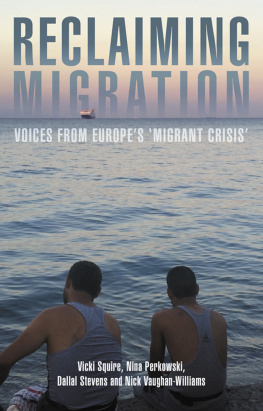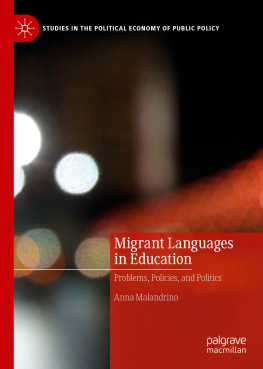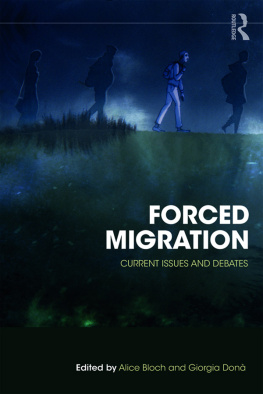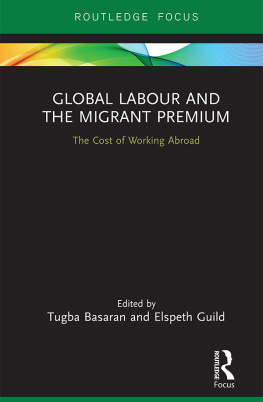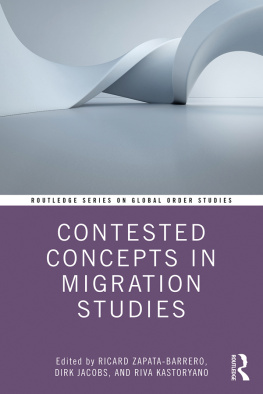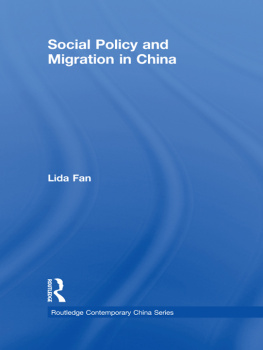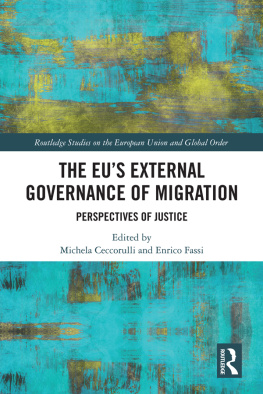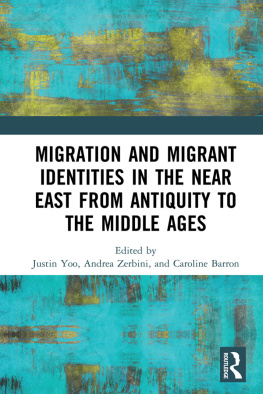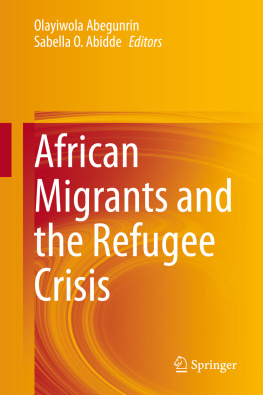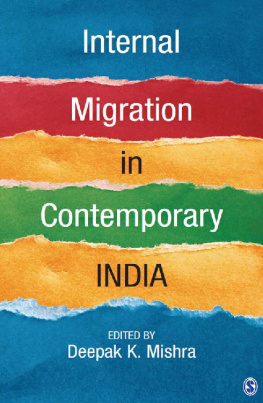Reclaiming migration
Voices from Europe's migrant crisis
Vicki Squire, Nina Perkowski, Dallal Stevens and Nick Vaughan-Williams
Manchester University Press
Copyright Vicki Squire, Nina Perkowski, Dallal Stevens and Nick Vaughan-Williams 2021
The rights of Vicki Squire, Nina Perkowski, Dallal Stevens and Nick Vaughan-Williams to be identified as the authors of this work have been asserted by them in accordance with the Copyright, Designs and Patents Act 1988.
Published by Manchester University Press
Altrincham Street, Manchester M1 7JA
www.manchesteruniversitypress.co.uk
British Library Cataloguing-in-Publication Data
A catalogue record for this book is available from the British Library
ISBN978 1 5261 4481 2hardback
ISBN978 1 5261 4483 6paperback
First published 2021
The publisher has no responsibility for the persistence or accuracy of URLs for any external or third-party internet websites referred to in this book, and does not guarantee that any content on such websites is, or will remain, accurate or appropriate.
Photos: Dallal Stevens
Design: www.rumneydesign.co.uk
Typeset by New Best-set Typesetters Ltd
First and foremost, we would like to extend our sincere thanks to all those people who have generously and courageously shared their stories and struggles with us as part of this research. This book is dedicated to all of those who continue to experience the effects of crisis politics today.
A warm thanks also to our friends and colleagues, Angeliki Dimitriadi and Maria Pisani, whose incredible work has been vital to the research on which this publication is based. We also extend our sincere appreciation to Vasiliki Touhouliotis for her excellent research during the second phase of the project (Athens and Istanbul), along with Skerlida Agoli (Kos), Emanuela Dal Zotto (Sicily), Alba Cauchi, Sarah Mallia and Mario Gerada (Malta) for their impressive efforts during the first phase of the project. In addition, we would like to sincerely thank all the translators who enabled us to speak to people on the move in different languages, as well as everyone who generously helped us obtain access to reception centres and informal camps across the various research sites.
, and to the anonymous reviewer for their helpful suggestions on an earlier draft of the text.
have been published as part of a journal article in Environment and Planning C: Politics and Space.
All royalties from the sale of this book will be donated to NGOs directly supporting people arriving to the EU under precarious conditions.
Introduction
Reclaiming migration: voices from Europe's migrant crisis
You can go round and ask the people and find more and more information. You can go round for even someone on the street and he passed this way he can tell you his history, history of suffering.
you have to understand asylum-seekers problems here. They are people who have fallen in a hole and cannot get out of the hole. You have to understand this and you have to get the information and after that you can make a sound and transfer our voices to the decision-makers and policymakers of European countries.
(IST2.14, man from Afghanistan, Istanbul)
These excerpts are taken from testimonies of people who had made or were contemplating making the dangerous journey across the Mediterranean Sea by boat during 2015 and 2016. They point both to the challenges that people faced at that time in Rome, Istanbul and elsewhere, as well as to the additional difficulty of making such challenges known. In other words, the testimonies above point to the processes of silencing experienced by people on the move as the European Union (EU) engaged migration as a crisis. It is this politics of crisis, as well as the experiences of voicelessness involved, that Reclaiming Migration seeks to challenge. It does so by directly engaging the largely unheard voices of people on the move. The book rejects both the silencing of people migrating in precarious conditions, as well as the crisis-oriented intensification of a preventative policy agenda across : 2). By focusing attention on the multiple ways through which people on the move contest these narratives of crisis, we highlight the importance of engaging a counter-archive of the testimonies of people on the move in challenging official truths about the situation in the Mediterranean during 2015 and 2016. Far from a benign response to a situation of human tragedy, we argue, a preventative policy agenda grounded in a politics of crisis both produces and embeds experiences of precarity such as those highlighted in the quotes that open this chapter. Speaking to the histor[ies] of suffering that people on the move continue to endure on arriving to the EU (ROM2.01) and to the holes that people can so easily fall into throughout various stages of the migratory experience (IST2.14), the demand to ensure that our voices reach the decision-makers and policymakers of European countries continues to resonate well beyond 2015 and 2016.
Setting the scene
: 2). This claim about large numbers of people arriving in the EU, combined with an understanding of 2015 as a critical moment in addressing migratory pressures, invoked a form of crisis politics that we argue eclipsed the demands of people on the move.
). Critically, a focus on increased arrivals and increased deaths at sea closed down any room for disagreement surrounding the need for decisive action. Moreover, it also situated people on the move as border transgressors and/or as victims in need of protection, rather than people with a voice within wider political and policy debates.
As well as a humanitarian crisis represented by mounting deaths at sea, the situation was thus also narrated as a crisis of increasing arrivals. The spring of 2015 was in this regard an optimal moment for the European Commission to advance a more long-standing preventative agenda with greater ferocity than ever.
A preventative policy agenda
: 7), it included:
- Reducing the incentives for irregular migration: Pillar 1 included actions designed to address the root causes of irregular and forced displacement in third countries; actions to combat smugglers and traffickers; and actions to ensure the effective return of irregular migrants.
- Border management saving lives and securing external borders: Pillar 2 included actions to strengthen the role of Frontex, the European Agency for the Management of Operational Cooperation at the External Borders (subsequently relaunched as the European Border and Coast Guard Agency in October 2016), and to ensure standardised border management across the EU; actions to coordinate coastguard functions and further develop Smart Borders proposals; and actions to strengthen the capacity of third countries to manage their borders.
- Europe's duty to protect:a strong common asylum policy: Pillar 3 included actions to ensure coherent implementation of the Common European Asylum System; and actions to ensure greater sharing of responsibility across member states through revisions to the Dublin system.
- A new policy on legal migration: Pillar 4 included actions towards a well-managed regular migration and visa policy; actions to ensure effective integration; and actions to maximise development benefits for countries of origin.

